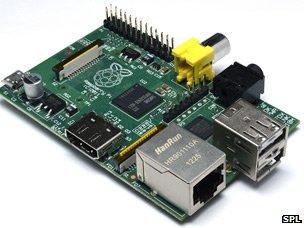The Pi Store opens
- Published
- comments

Another landmark today for what must be one of 2012's most successful new technology products, the Raspberry Pi. You've seen Apple's App Store, Google Play and Amazon and Windows online shops for apps? Well, now there is a Pi Store, external.
The people behind the ultra-cheap computer have decided to harness all that geek enthusiasm sparked since the Raspberry Pi's launch in February and create a one-stop shop where anyone can share games, applications and tools developed for the computer.
Eben Upton, the former Cambridge computing academic who came up with the idea for an affordable device that would encourage a new generation to get coding, has just blogged about the new store, external. He says he hopes it "will provide young people with a way to share their creations with a wider audience, and maybe to make a little pocket money along the way".
If that does happen, it will also provide useful evidence that the Raspberry Pi is reaching the audience at which it was originally targeted. Interest in the device has far exceeded expectations - the team thought originally that they might get 10,000 out this year, but I'm told more than 750,000 are now in the hands of users around the world. One user has compiled a map charting the Pi's global spread, external.
But my suspicion is that the main buyers so far have been 40-somethings who look back with nostalgia to their teenage years messing about with a BBC Micro or a ZX Spectrum. When I spoke to Mr Upton this morning, he confirmed that this was pretty accurate - "there's a strong bias towards adults who are computer literate" - but said that was changing a bit.
"Schools that are lucky enough to have an enthusiastic ICT teacher - or even a physics teacher - have been getting them."
But he accepts that the Raspberry Pi foundation, having successfully launched the hardware, now needs to focus on its original educational objective. The uncased device and the lack of much educational support is intimidating for teachers who are not particularly techie.
There are big plans to change that in 2013. "The intent is to have something that can go into a generic classroom environment," he said.
By the time Raspberry Pi celebrates its first anniversary at the end of February, more than a million will have been sold - an amazing achievement for what has been a shoestring operation dependent on voluntary efforts and the enthusiasm of the community. The next step is to build a more professional organisation which can fulfil the original vision - to transform the way children use and understand computers.